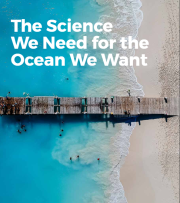“Just as no one nation or region can solve the problems facing the oceans, neither can any one organization. IOC must not just continue but must enhance its collaboration and cooperation -with its partners in UNESCO, the UN family, with Member States, Nongovernmental and scientific organizations…” said Dr. Wendy Watson-Wright, Executive Secretary of IOC and Assistant Director General of UNESCO at one International Symposium on the role of Indo-Pacific Oceans in Climate Change and Variability on 2 December 2010, United Nations University, Japan.
The Indo-Pacific oceans constitute key regions in the Earth’s climate system. The Indo-Pacific Warm Pool, having the highest sea surface temperatures (SSTs) of the global oceans, contributes to vigorous ocean-atmosphere interactions, and hence affects climate worldwide. It has an active role in regional ocean-climate processes such as the Asia-Australia Monsoon, intra-seasonal Madden Julian oscillation (MJO) and also shorter time scale severe weather events such as typhoons and cyclones. Over past decades, abnormal weather such as extremely heavy snowfall, cold snap, continuous rainstorm has been increasing lately. These abnormal weathers are thought to be caused by frequent happening of climate variability phenomena in the Indo-Pacific Oceans, such as El Niño/Southern Oscillation (ENSO) and the Indian Ocean Dipole (IOD).
The international symposium is organized by the Ministry of Education, Culture, Sports, Science and Technology and the Japanese National Commission for UNESCO, in commemoration of the 50th Anniversary of IOC, aiming to review the current world-wide efforts and further explore the new opportunity for cooperation in observations, numerical model development in the Indo- Pacific Oceans for climate prediction. More than one hundred participants from ocean research institutes, governmental agencies, universities and donor agencies participated in this symposium.
During the Symposium, Dr. Watson-Wright was also invited to visit and warmly received by high-ranking officials of the Japan Agency for Marine-Earth Science and Technology (JAMSTEC), Japan Meteorological Agency (JMA), and Ministry of Education, Culture, Sports, Science and Technology (MEXT). While appreciating the contribution of Japan to IOC programs, she also discussed the future cooperation between IOC and Japan.
The Intergovernmental Oceanographic Commission of UNESCO, founded in 1960, has been instrumental in promoting marine scientific research, observations and services as well as capacity building worldwide. Continuous efforts have been made to advance the establishment of regional ocean observing systems over and around the Indo-Pacific Oceans, mainly through its Regional Subsidiary Bodies and GOOS Regional Alliances. This network of alliances over Indo-Pacific Oceans includes South East Asian GOOS (SEAGOOS), Indian Ocean GOOS (IOGOOS), and Pacific Islands GOOS (PIGOOS).




